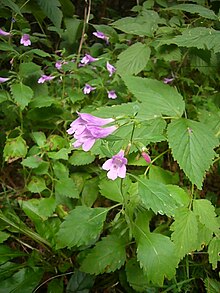Clinopodium grandiflorum
Appearance
This article needs additional citations for verification. (April 2023) |
| Large-flowered calamint | |
|---|---|

| |
| Scientific classification | |
| Kingdom: | Plantae |
| Clade: | Tracheophytes |
| Clade: | Angiosperms |
| Clade: | Eudicots |
| Clade: | Asterids |
| Order: | Lamiales |
| Family: | Lamiaceae |
| Genus: | Clinopodium |
| Species: | C. grandiflorum
|
| Binomial name | |
| Clinopodium grandiflorum (L.) Kuntze
| |
| Synonyms[1] | |
Clinopodium grandiflorum, the large-flowered calamint, showy calamint or mint savory, is a species of ornamental plant.
Description
[edit]C. grandiflorum is a perennial herb that grows up to 25 cm (9.8 in) tall. It has pink flowers and ovate green leaves.[2]
Distribution and habitat
[edit]It grows in certain mountains of western and southern Europe (Massif Central, Alps, Pyrénées,...) above 700 meters high. It can be found in beech forests.
Use
[edit]It can be used in cooking, and in herbal medicine for bruises and cramps.[3][unreliable source?]. In the Aubrac region of France, it is used as an infusion and called "thé d'Aubrac" (Aubrac tea); it is appreciated for its digestive properties.
References
[edit]- ^ "Clinopodium grandiflorum (L.) Kuntze". Plants of the World Online. Royal Botanic Gardens, Kew. 2023. Retrieved 7 March 2023.
- ^ "Clinopodium grandiflorum | greater calamint Herbaceous Perennial/RHS Gardening". www.rhs.org.uk. Retrieved 2023-04-11.
- ^ "Medicinal uses". Herbs. Retrieved 6 January 2012.
- Pink, A. (2004). Gardening for the Million. Project Gutenberg Literary Archive Foundation.
External links
[edit]This article needs additional or more specific categories. (March 2023) |
